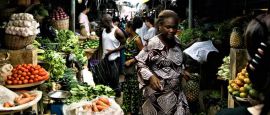Money & duty free for Nigeria
Exchange rates:
NairaC$1 = ₦236.69
€1 = ₦330.18
£1 = ₦393.18
US$1 = ₦317.5
Currency & Money
The Nigerian Naira (NGN; symbol ₦) is divided into 100 kobo. Banknotes are in denominations of ₦1,000, ₦500, ₦200, ₦100, ₦50, ₦20, ₦10, and ₦5. Coins are rarely used but officially available in ₦1 as well as 50, 25, 10, 5, and 1 kobo denominations.
Credit cards are accepted at major hotels, restaurants, and some large retail outlets in cities, but their use is limited in smaller towns and rural areas. Visa and Mastercard are the most widely accepted. Travellers should carry cash as a backup, particularly when travelling outside major urban centres.
ATMs are widely available in cities and large towns, and many accept international cards. However, machines may occasionally be out of service or have low withdrawal limits. Visitors should use ATMs located inside banks or secure areas for safety.
When entering or leaving Nigeria, travellers are required to declare amounts exceeding $10,000 or its equivalent in other currencies.
Foreign currency can be exchanged at banks, authorised bureaux de change, and some hotels. The US dollar is the most widely accepted foreign currency, followed by the euro and the pound sterling. It is not advisable to exchange money on the street due to the risk of fraud. Always request a receipt when exchanging currency.
Nigeria duty free
The following goods may be imported into Nigeria by travellers over 18 years of age without incurring customs duty:
• 200g of tobacco products.
• 1L of spirits and 1L of wine.
• 284ml of perfume.
• Gifts to the value of ₦50,000 (excluding jewellery, photographic equipment, electronics and luxury goods).
Prohibited imports include birds and birds' eggs, pork, beef, water containing added sugar or sweeteners, certain medicines and mosquito repellent coils.
This list is not exhaustive. Travellers should consult the official customs website www.customs.gov.ng or contact the embassy or consulate near you for the most up-to-date information.




 You know where
You know where